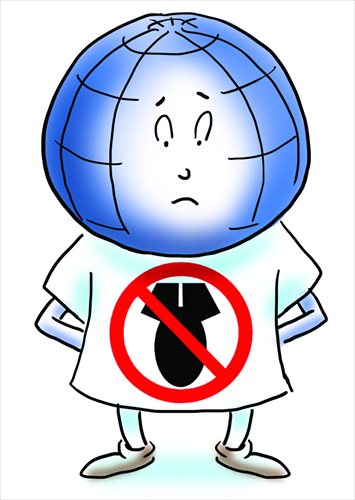HOME >> OP-ED
Is US serious about a nuclear-free world?
By Zhao Minghao Source:Global Times Published: 2016-3-31 2:30:55

Illustration: Liu Rui /GT
The fourth Nuclear Security Summit (NSS) is to be held in Washington DC today. This is US President Barack Obama's final such meeting and Chinese President Xi Jinping will attend it. No matter who is elected to the White House this November, Washington will be confronted with the most complicated and gravest nuclear security challenges since the end of the Cold War.Although Obama vowed to build a world free from nuclear weapons in 2009, it's the US itself that is launching a large-scale upgrade of its nuclear arsenals. According to an Obama administration plan, Washington will spend up to $1 trillion consolidating its superiority in nuclear weapons, which will enable the addition of 12 nuclear-armed submarines and hundreds of upgraded nukes.
The US also hasn't ratified the Comprehensive Nuclear Test Ban Treaty. Besides, allies of the US show little interest in the "world without nuclear weapons" proposal. Britain has planned to buy more nuclear submarines so as to renew its nuclear deterrence capabilities at sea in the 2030s.
Japan and India have been striving for a final agreement on nuclear cooperation. If Japan gives special treatment to India over nuclear technology exports, it will undoubtedly add uncertainties to the nuclear non-proliferation system.
Russia plays an important role in nuclear nonproliferation, but the bilateral negotiations by Russia and the US on nuclear disarmament are stagnant. The Putin government is heavily critical of the standards on nuclear nonproliferation the US and its allies uphold.
Moscow believes the US deployment of missile defense systems in Europe and the Asia-Pacific region has broken the balance of the global strategic pattern, so does China. US tactical nukes are directly stationed on Russia's doorstep. The absolute security of the US means the insecurity of Russia, and the boundary between missile defense and missile strike becomes more blurred.
Putin won't attend the NSS this time. US strategists are worried that Moscow is amending its nuclear doctrine to lower the threshold for nuclear use in conflicts. A report released by the 2016 Munich Security Conference says that the risk of using nuclear weapons in the Euro-Atlantic region is on the rise, and it is higher today than it has been since the end of the Cold War.
When major global powers are wrestling over issues such as nuclear non-proliferation and disarmament, nuclear risks are on the rise. The prospect of solving the North Korea nuclear problem is depressing. The Islamic State terrorist group is also trying to acquire nuclear weapons.
At the initial stage of nuclear development, many countries are weak at nuclear management. There are many problems and security weaknesses in managing radioactive materials. In order to ensure the sustainability of the nuclear use, we must enhance management on radioactive sources, improve abilities to deal with emergencies, and strengthen nuclear security awareness of the society.
Nuclear security problems are having an increasing influence on China. Many nuclear powers are located on the periphery of China, including Pakistan and India, where the possibility of a large-scale conflict cannot be excluded. And as China is developing nuclear power for civilian use and restructuring its energy consumption, it needs to prevent security risks. Currently, the percentage share of nuclear power in the global power mix is 12 percent, while in China nuclear power only accounts for 2 percent of its usage. According to China's medium- and long-term nuclear industry development plan, the nation's nuclear power installation capacity will reach 58 million kilowatts by 2020, by which the nuclear power will make up 5 percent of China's energy mix.
China is gradually becoming a key player in the global nuclear security sphere. It firmly supports to international cooperation in this field. The historic Iran nuclear deal reached in 2015 was a result of close coordination among China, the US, Europe, Russia and other parties.
The attendance of Xi at the NSS displays the great importance China has attached to constructing the international nuclear security system. In 2014, Xi elaborated on China's nuclear security concept for the first time in the Hague summit. In the Washington summit this year, China will submit a nuclear security report and Xi will put forward proposals on enhancing global nuclear security.
Despite divergences in many aspects, both China and the US are willing to deepen communications on nuclear security. They held a nuclear security dialogue for the first time in February 2016. Cooperation on nuclear security could be the highlight of cooperation in strategic domains in building a new type of major power relationship between China and the US.
The author is a research fellow at the Charhar Institute and an adjunct fellow at the Chongyang Institute for Financial Studies at Renmin University of China. opinion@globaltimes.com.cn
Posted in: Viewpoint